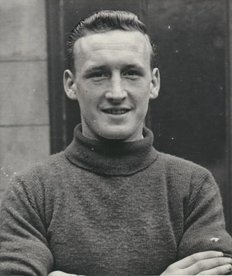
Remembering: Ron Baynham
Julian Pugh celebrates the life of the only City player to ever go on to play for England as a full international
Words from Julian Pugh
Ron Baynham, who has sadly passed away at the age of 94, was until has death the oldest surviving England international player and he was most likely City's oldest living player too. He holds a special place in our history as he is the only City player ever to go onto appear for England at full international level.
Born in Erdington, Birmingham on 10 June 1929, Ron preferred cricket as a youngster and only started playing football when his brother put him in goal for their local junior team. Ron was a success in amateur football. He was then called up for National Service in the Army. Upon his discharge, he played for Bromford Amateurs and in season 1949/50 he won a Birmingham Alliance championship medal. City manager Jack Vinall heard that he was available via another City player, Arthur Haynes, who lived near to Ron. City’s regular goalkeepers Norman Jones and Bert Rogers had both been transferred in the 1950 close season, and Ron joined City in August 1950 after appearing in a pre-season trial match. Former Wales amateur international Percy James was signed from Luton at the same time, and this started a chain of events that would to lead to a long Football League career and England caps for Ron.
At the time Worcester City were in desperate financial circumstances and had released many of their better players. They started the 1950/51 season badly, but Baynham quickly became our first team goalkeeper and proved his class with a number of excellent displays. Vinall, disheartened by bad results and lack of money, resigned in November. The club directors, impressed by the wide number of contacts Percy James had, offered him the manager’s job.
Results improved but money was still very tight and a match was arranged against a Stanley Matthews XI at the end of the season to raise funds. This brought Ron to the attention of a number of Football League scouts, but there were no firm offers. The financial situation was still very tight and James virtually talked former Luton keeper Tommy Gibbon into recommending Baynham to the Hatters, who duly offered a fee of just over £1,000. The City board turned down Luton’s offer at first, but under pressure from creditors, quickly agreed when Luton came back with fresh terms a fortnight later, and after 73 games, Ron was sold in November 1951. The cash raised by the sale probably saved City from bankruptcy and proved to be a sound investment for Luton.
Luton already had Bernard Streten, an England International, as first choice keeper. Ron did not make his Luton first team debut for a year, in a Division 2 game against Doncaster Rovers, but then he rapidly claimed a regular place. His ability earned selection to the Football League and England B Teams as Luton earned promotion to Division 1 in 1954/55.
First Division football brought out the Baynham best and he was rewarded with three England caps in 1956, against Denmark, Spain and Ireland. England won all three matches. Despite this, Ron was discarded as Walter Winterbottom built up his team for the 1958 World Cup, perhaps because he played for a less fashionable club. He never appeared for England again, but won an FA Cup runners-ups medal in 1959, when Luton lost to Nottingham Forest at Wembley.
In 1960, Luton were relegated, and on September 24 1960, Ron fractured his skull playing against Sheffield United. To replace him, Luton signed another man with Worcester connections, the footballer/cricketer Jim Standen. Although Ron was fit again by the end of the season, he found he needed to share goalkeeping duties with Standen, finally losing his place late in 1961.
He caused headlines by being selected in an Easter match against Leyton Orient as a centre forward, an experiment that lasted only one game when Luton lost 1-3. After Standen was transferred to West Ham, Baynham regained his place, playing on for another two and a half seasons until a pelvic injury led to his retirement in February 1965. All told he played 424 games for Luton.
After retirement from football, Ron earned a living working as a painter and decorator in the Bedford area. He also worked at Luton Airport for some years. He continued his long involvement in sport by turning out regularly with his village cricket team.
In 2020 he was voted by fans as Luton's best-ever goalkeeper. Although he never came back to Worcester, he deserves to be celebrated as one of the greatest players in our history.

